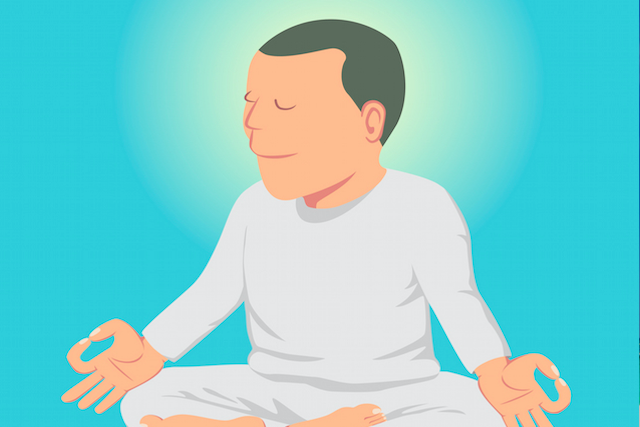
“There is only one way to happiness and that is to cease worrying about things which are beyond the power of our will.” ~Epictetus
Sweaty. Hot. Shallow breathing.
Thoughts barreled through my mind like a never-ending freight train. I couldn’t keep up. It was everything all at once, blurred into nothing in particular.
I felt like I was about to jump off a cliff, nervous anticipation building into panic. My head was spinning. My hands trembled.
Choking down a gulp, I forced the tears back that wanted to cascade down my cheeks in sobs. There would be time for that later. This wasn’t the place.
My heart raced. I was on edge. I was on the edge.
I’d catch glimpses of my thoughts as they rumbled through my brain.
Impending foreclosure on our old house. The psychiatric hospital I had been to six months ago. Bankruptcy paperwork that still needed finished.
The kids trying to make friends at their new schools. My wife playing with the budget for hours to make ends meet. Me falling asleep in my car left running in the closed garage.
I was at work. I was having a severe panic attack. And I had to go home.
Luckily, most of my anxiety attacks aren’t this severe. And thankfully, they don’t happen too often any more. Happily, this attack, which came out of nowhere and hit hard, disappeared as quickly as it came on.
The longer I deal with and work to manage my anxiety, the more I find I can learn from it. This in turn helps me cope better the next time anxiety comes along.
Here are some things I’ve learned about anxiety through my years of dealing with it:
1. Anxiety is a lie.
No matter how close to home anxiety hits, there is always a lie hiding in it somewhere.
Maybe it’s based on a false belief. Maybe the problem doesn’t have to be dealt with as immediately as it feels. Maybe there are options we haven’t considered.
But anxiety always—always—contains a lie. It might be big and in our face or it could be small, tricky and subtle. Look hard enough and we will uncover it.
One of the most powerful tools I’ve gained through working with a therapist on anxiety is learning to look for the lie. It’s difficult at first; we have to sit with our anxiety and pick through it a little bit at a time, and that’s certainly not a comfortable thing to do, but if we’re careful and patient we can find the lie. Finding the lie takes the teeth out of the anxiety.
And when we take the teeth away from anxiety, we can really begin to free ourselves. Anxiety needs a hook; it needs something to gnaw at us to keep it forward in our minds. By finding the lie and taking that hook away, we take away anxiety’s power over us.
2. “Should” should be a four-letter word.
Unreasonable expectations are, for me, at least, one of the biggest causes of anxiety. Some of the expectations I still struggle with are patterns of thinking that I can trace back to when I was a child. Because they’re so deeply engrained, they’re some of the toughest to get rid of.
When I was a kid, I was pretty smart. Things came easily to me. I learned quickly.
My parents, meaning to encourage me, told me I could do anything I wanted. And I believed them. And I started to expect anything I wanted out of myself.
When you’re a kid, you can get away with that. If I wanted to do something, I’d learn it and do it, end of story. As an adult, things became more complicated.
We can’t just want a particular job and make it happen. There are too many outside circumstances and other people involved. I should do that particular job isn’t just something that happens when you put your mind to it.
When we start thinking about how we should be, we can really get ourselves into a trap. We should be this to that person and this when we do that—we’re just continually setting ourselves up to fail. “Should” doesn’t allow for any wiggle-room or compromise.
“Should” can hurt us in other ways too.
3. “Perfect” should be a four-letter word, too.
I’m a bit of a perfectionist, so for me, being good at something isn’t good enough. I should be perfect, dammit! Please tell me you caught the “should” in that statement, right?
Perfectionism is my old reliable. My trusty friend. My almighty hammer.
The expectations that come from perfectionism can bury us alive. It’s a never-ending race that we’re never going to win.
No matter how much I want to, I will never be the perfect husband, father, or son. The amount of anxiety I have felt in my forty-two years of life trying to be one of these three things is immeasurable. Think about how much time I’ve wasted worrying about being something I could never be.
Perfect is such a damaging expectation, in any respect. When “good” or “just okay” will suffice in most situations, why do we torture ourselves chasing an impossible ideal?
The truth is, when perfectionists start settling for “good” is when we really start to shine. We’re unencumbered by the restraint of high expectation and that allows us to work to really high levels—levels we’ve probably been failing to hit in the past.
Anxiety comes about when we place these unattainable, perfect goals in front of ourselves. And our failures, which we will most certainly encounter, only serve to push us harder after our goals. Perfectionism becomes a never-ending cycle of anxiety and failure that we need to let go of.
4. Anxiety is an ultimatum.
The last lesson I’m taking away from this recent panic attack is this: anxiety always makes you an ultimatum. All or nothing. Black or white.
There is no gray area when it comes to anxiety. Now don’t get me wrong, anxiety will hide in the subtleties of our doubts, but it will force us into taking a black and white view of ourselves, our situation, or our surroundings. Anxiety leads us to think that we’ve got only one choice to make.
In my panic attack, I got overwhelmed by several different situations I’m dealing with right now. I am facing foreclosure on the house I’ve just moved out of. I am in the process of filing for bankruptcy.
My kids are having to adjust to being the new kids at their schools since we’ve moved. We do have to be careful with our money right now. I am scared that I will have to go back to the psychiatric hospital again—or worse.
But my anxiety attack turned all of these things into ultimatums for me. I felt like I had to resolve all of these issues at once (and immediately!) or the world would end. The fear I felt was so strong I was unable to think these problems through rationally.
Once I did get home from work, I cried myself to sleep. Waking up, I could feel that the fear had left me. I was able to look at myself, the anxiety attack, and my problems in a clear-headed manner.
What I saw was man suffering from anxiety, having been hit, but not harmed, by severe panic. I saw a man that was regaining his composure, a man who was moving on. I saw a man who was stronger for what he had just been through.
Peaceful man image via Shutterstock
About Jason Large
Jason Large has been experiencing depression and anxiety for twenty-six years. He has recently made a link between his own troubles and his family's history. He writes with the hope of helping others in similar circumstances. If you’d like, you can reach Jason on jasonlarge73@gmail.com.













 Though I run this site, it is not mine. It's ours. It's not about me. It's about us. Your stories and your wisdom are just as meaningful as mine.
Though I run this site, it is not mine. It's ours. It's not about me. It's about us. Your stories and your wisdom are just as meaningful as mine. 